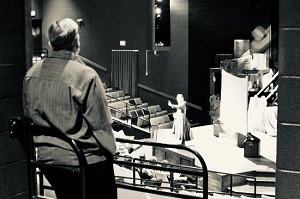
Riffing off Ruhl, my posts on dramaturgy are not necessarily faithful descriptions of my process but rather views of certain aspects of it from just to the left of the experience.
After The Three Keys of Captain Hellfire opened my director, David Lee-Painter (DLP) asked if I would dramaturg his next project, This Random World by Steven Dietz in the fall. The idea of researching someone else’s play was vaguely terrifying. I knew nothing about how to do it. In the past, I would’ve fled. This time I said, “Yes.”
So it was that I began learning dramaturgy and researching The Clean House.
The perfect joke makes you forget about your life.
The perfect joke makes you remember about your life.
The perfect joke is stupid when you write it down.
The perfect joke was not made up by one person. It passed through the air and you caught it.
A perfect joke is somewhere between an angel and a fart.
—Sarah Ruhl, The Clean House
Sometimes I’m thinking so hard that I miss the joke.
The Clean House opens with a joke. A joke told in Portuguese. It is a long joke. Being unable to understand the joke itself, the audience is left with only the shape of a joke. A device to make the audience observe the joke from the outside (Muse). It is another way of making the familiar strange. Ruhl let us into The Clean House on what was for me—these are my ruminations—an abstract point of entry that proved to set the tempo for the rest of the story.
From: DLP
Subject: The joke
I’m ruminating about the opening of The Clean House.
THAT first joke is super important. It’s in Portuguese
– and we can’t understand it.
WHEN is Matilde telling it? To whom?
“WHEN is Matilde??” With that trigger, ideas move. Ruhl’s story has an elasticity. It’s a joy to pull and stretch. The freedom she gives to explore. Burning through ideas but ultimately returning to the truth of the story she has created. To read it again. And again. The script is a tether.
It’s the past. Before she’s a comedian in deed.
Before the perfect joke comes to her.
It’s Brazil and somewhere safe.
May be with her parents.
It is now and the death of her parents cloak her
from telling the perfect joke which she also fears.
If top of show is the future, then she’s moving
backwards through time in the null space?
At the end of the story is her birth.
In her dissertation on comic dramaturgy, Jennifer Goff references the writing of Andrew Stott. (I know quoting someone else quoting is a no-no, but this is a blog.) In the realm of stand-up, a comic can present multiple perspectives in setting up a joke. Often they show us one point of view before presenting another that is incongruent with the first. “….like a silent but parallel conversation that could audibly erupt at any moment.”
Goff describes the technique as a “comic subversion.” She finds that Ruhl uses it and repurposes it “in service of a deeply profound view of the power of the joke.”
Are jokes apples?
There’s something compassionate about humor; it has a saving power. It seemed to me that if you took the most sublime version of a joke— the Platonic ideal of a joke—that it could transport you somehow. I remember when my father was sick that humor was a form of grace in the household. Humor pushed to an extreme, like any emotion, has a transformative power. In the play the joke is abstracted, but we see the compassion of one woman killing another woman with a form of euthanizing humor. Mathilda is willing to do this for Ana without even thinking about it—she takes pity on Ana and kills her with a joke, and that’s the emotional heart of the play.—Sarah Ruhl (Weckwerth)
From: Ariana B
Is Clean House trying to be the perfect joke?
From: DLP
Damn fine question – the joke is so important –
both kills her mother and Ana.
One causes great pain,
one relieves great suffering.
From: Ariana B
Or may be both relieve great suffering.
That final transformation……
“Heaven is a series of untranslatable jokes.”
–Sarah Ruhl, The Clean House
#DLPAnotherFineMess #theatre #dramaturgy
Photo by Daniel Haley
Dunne, Will. The Architecture of Story: A Technical Guide for the Dramatic Writer.
Goff, Jennifer Ann. “If More Women Knew More Jokes…” The Comic Dramaturgy Of Sarah Ruhl And Sheila Callaghan, dissertation, Wayne State University, Detroit, Michigan, 2015.
Muse, Amy. The Drama and Theatre of Sarah Ruhl.
Weckwerth, Wendy. More Invisible Terrains, Sarah Ruhl, Interviewed by Wendy, Theater (2004) 34 (2).
Zuheir Al-Shamma, James. Grief and Whimsy in the Plays of Sarah Ruhl, dissertation, UC-Santa Barbara, 2008.